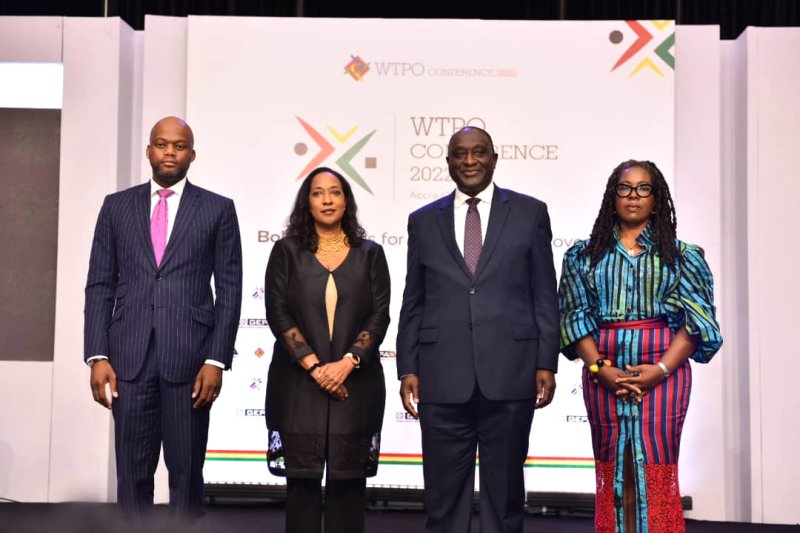Accra, May 17, GNA – Mr Alan Kyerematen, the Minister for Trade and Industry has tasked Trade Promotion Organisations worldwide to effectively support Micro, Small and Medium Enterprises (MSMEs) to address the challenges of the post-COVID economy.




He said the assistance for MSMEs was now a development imperative because of their key role in employing majority of the world’s workforce.
Mr Kyeremanten was addressing the opening session of the 13th World Trade Promotion Organisations conference and awards in Accra to discuss ways in which they could best support the private sector to enhance production and productivity levels.
The conference is being held on the theme: “Bold solutions for Resilience and Recovery.”
He said for Trade Promotion Organisations (TPOs) to effectively play their expected roles governments around the world, particularly in developing countries, needed to put trade at the centre of their development agenda.
“Trade must be mainstreamed in national development plans. Programmes and projects that enhance trade must be aggressively pursued by TPOs,” he said.
He said TPOs must identify specific areas where global trade disruptions had created opportunities for scaling up local production in their national economy and build partnerships with private sector business associations to take advantage of such opportunities.
Also, TPOs should identify existing or potential exporting companies that can leverage opportunities for exports, particularly to regional markets arising from trade disruptions in the supply of goods to those markets.
TPOs should facilitate the use of regional value chains to exploit market opportunities around the world for MSMEs.
Trade and Investment Promotion Organizations where they operate independently of each other, must enhance the level of collaboration between them, to attract investments into the domestic economy that will facilitate both domestic and foreign trade.

He said TPOs must enhance the use and deployment of digital platforms in facilitating trade across borders while they prioritised the role of regional markets and intra-regional trade in programming technical support and assistance for MSMEs.
In this regard, TPOs on the African continent must work actively to support the implementation of the African Continental Free Trade Area (AfCFTA) Agreement, which presents the continent with the best opportunity, not only to enhance the level of intra-African trade, but to leverage the collective strengths of African enterprises to deepen Africa’s participation in global trade
Mr Wamkele Mene, the Secretary-General, AfCFTA Secretariat, said Africa’s private sector, a key pillar of the economy, was severely affected by the pandemic as it took its toll on SMEs.
He said despite the uncertainty in the world economy, it was now time to rebuild the countries’ economies and secure Africa’s future.
Mr Mene said the effective implementation of the AfCFTA agreement such that trade becomes the driver of economic recovery and a significant contributor to Africa’s growth and development was crucial at this time.
“So, as we transition from the pandemic to a new normal marked by renewed efforts at continental integration, let us work together to strengthen our integration including through digitalization. This will enhance intra-African trade; build resilience to future crises; and ensure the continent emerges more connected, and more inclusive.”
“It is, therefore, vital that under the current circumstances, the SMEs are supported to survive and adapt, as they can be a key component on the road to economic recovery on the continent.”
He said adopting a regional/continental approach to developing value chains would enable African countries to create economies of scale and use their comparative advantages.

It would also ensure that countries without manufacturing capacity would be able to access products from within the continent.
Dr Afua Asabea Asare, the Chief Executive of the Ghana Export Promotion Authority, said the Authority was committed to supporting small businesses to build their capacities and resilience to enable them to compete favourably on international markets.
She said the success of Ghana’s National Export Development Strategy, launched in 2020 under the auspices of the Ministry of Trade and Industry, was to achieve export earnings of USD25.3billion by 2029 through boosting productivity levels of exports, creating an enabling business environment to encourage increased exports and building the capacity of persons in the value chain of Exports to enable them to compete favourably in international markets.
Dr Asare expressed the hope that the conference would provide the needed trends and insights to enable TPOs support MSMEs even more, drawing from the experiences of various markets.
Ms Pamela Coke-Hamilton, Executive Director, International Trade Centre, said the way SMEs had been damaged over the last two years was unparalleled and it was more critical for trade promotion organisations, like all the other peers, to come together to share experiences to examine what had been done right.
She said it was important for TPOs to examine critically the major happenings in the world and begin to look at strategic ways in which trade promotion organisations could help SMEs to survive.
Meanwhile, the ITC has signed a deal with the AfCFTA Secretariat to promote the growth of small businesses to enable them to participate fully in the continental trade agreement.